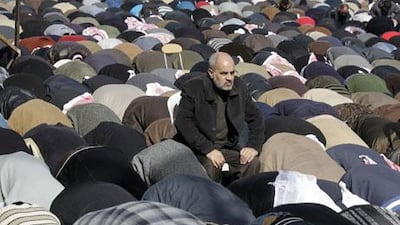AMMAN // Jordanians are divided over whether this week's parliamentary election is a chance for real change or an unfair vote that should be boycotted.
The elections, in a country facing an economic crisis, were called by King Abdullah II in response to demands for reform that gathered strength after the Arab Spring uprisings.
The king has said the vote on Wednesday will "crown the reform process", but the political arm of the Muslim Brotherhood is protesting against the election.
Dozens of independents, nationalists and leftists also oppose the new electoral system that they say favours tribally affiliated candidates over political parties.
Yet candidates are moving ahead with their campaigns. Tree trunks and electricity poles across the country are cluttered with election posters; mostly making empty election promises. In the capital, fancy tents have been pitched, furnished with carpets and curtains as speakers blare out music in praise of King Abdullah, while waiters rush to offer would-be voters pastries and unsweetened coffee.
Amid this festive electioneering, many Jordanians remain disenchanted.
"I did not register and I will not vote," said Ahmad Zyoud, 43, on the outskirts of Amman. "The elections are only to distract people from their problems. Parliament does not have a role, its decisions come from above."
King Abdullah has made modest concessions to the opposition since protests started two years ago but he is wary of the rise of Islamists across the region, refusing to heed calls for further reforms, including a senate that is elected rather than appointed. Jordan's protest movement, known as Herak, has called for less power to be concentrated in the king's hands.
In Amman on Friday, an anti-election rally by the Brotherhood's Islamic Action Front and other opposition groups highlighted their discontent with the current system.
But for other Jordanians the election is an important step as the country attempts to move forward
Munem Naeem, 39, has faith in King Abdullah's reforms and the role of parliament but admitted that the dissenting voices should have been heard.
"I want to vote because one wants what is best for the country. We want reforms and that is the most important thing." he said.
"Yet elections should have been postponed because many people say they do not want to vote. We hope members of parliament will do a good job. They know what people want and I am optimistic."
If all goes well, the elections will open the way for the first parliamentary government since 1956, when Jordanians had a taste of a more democratic political system. But after an attempted coup to overthrow him, the late King Hussein then disbanded parliament and imposed martial laws.
The opposition, however, has several concerns about the current electoral system. Although the one-person/one-vote system - which allowed each voter to vote only for an independent candidate - has been amended, critics say the new system introduced in July last year does not go far enough.
The new law includes a mixed electoral system, giving voters two ballots: one for a candidate in their constituency and one for party or national lists elected by proportional representation at the national level.
The system sets aside 27 of parliament's 150 seats for political candidates. But the remaining seats are likely to be dominated by East Bankers - people who have lived in Jordan before Palestinians started arriving in 1948. East Bankers are generally loyal to the King.
Their representatives are expected to control parliament because the electoral law over-represents rural conservative districts and underrepresents the urban Palestinian-dominated areas which are Islamist strongholds.
The Brotherhood's Islamic Action Front, which draws the majority of its support from Palestinians in Jordan, says the system is unfair because districts in which Palestinians live will get disproportionally lower representation in parliament, despite them making up more than half of the country's population of 6.5 million.
The Economist recently highlighted that in two mainly Palestinian districts of Amman, 310,000 voters elect as many MPs as 122,000 tribesmen in the southern city of Karak. After the elections, parliamentary blocs will also choose the prime minister, whom the opposition wants elected through a direct vote.
King Abdullah has defended the scope of his reforms, writing in a discussion paper that these elections would "pilot the first parliamentary government".
Bassam Haddadin, minister of political development, conceded that the "next parliament will not be ideal" but added that the changes to the electoral law "will train Jordanians on a new way to choose members of parliament".
Critics also point to rampant corruption, the arrests and alleged torture of political activists, restrictions on media laws, a huge budget deficit, price hikes, and growing unemployment as reasons to call for substantive political reform.
Anger is simmering among ordinary Jordanians about the state of the economy and thousands took to the streets in November last year to protest against a 53 per cent price increase in gas and a 12 per cent hike in petrol.
"Jordan had a missed opportunity because there is no consensus on the election law. Elections at the current stage will deepen the crisis," said Taher Adwan, a former information minister and the head of Maqar, an online newspaper.
Against this backdrop, "these elections have lost their legitimacy even if the government finds a way to increase voter turnout", said Muath Mulhem, a coordinator in Irbid for the National Front for Reform, an opposition group.
The concerns about voter apathy resonate even among candidates. "If people vote, this will put an end to the protest movement. But the concern is if they choose not to," said Ahmad Safadi, a former member of parliament, running for the third time. "No matter how ineffective parliament is, it is always better to have it since it can exert pressure on the government. This time parliament will have more authority because there will be no vote rigging or interventions. People will also hold parliament accountable."

